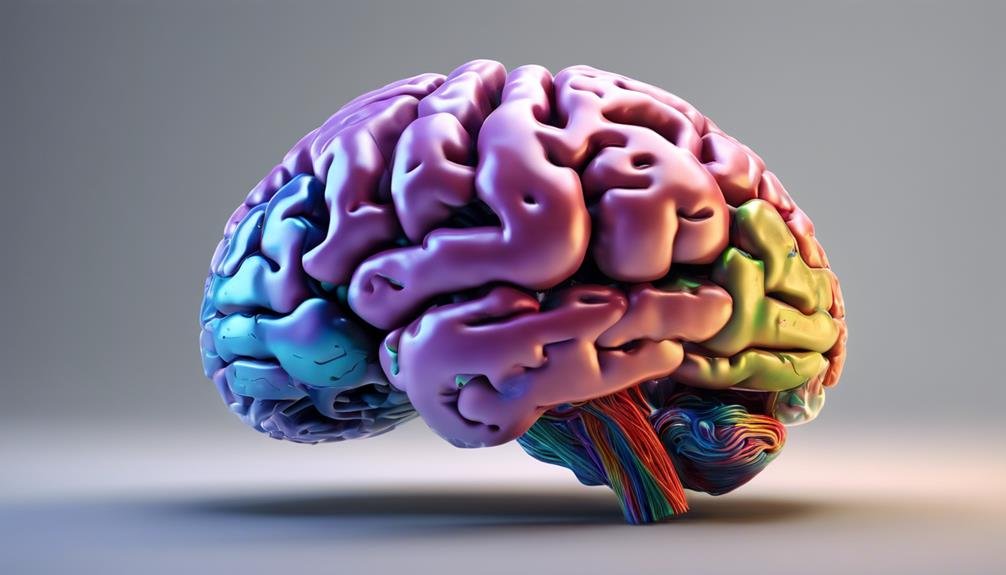Neurotransmitters and Personality
Did you know that neurotransmitters not only regulate bodily functions but also play a significant role in shaping your personality? Understanding how dopamine, serotonin, GABA, acetylcholine, and norepinephrine influence your thoughts, emotions, and behaviors can provide valuable insights into what makes you uniquely you. By exploring the intricate connections between these neurotransmitters and various personality traits, you'll uncover a fascinating world where brain chemistry intertwines with individuality, paving the way for a deeper comprehension of human nature.
Key Takeaways
- Dopamine influences motivation, reward processing, and decision-making, impacting personality traits.
- Serotonin regulates mood, emotional balance, and well-being, shaping individual personalities.
- GABA levels modulate anxiety, affecting personality traits related to stress responses.
- Acetylcholine influences memory, learning, and attention, shaping cognitive aspects of personality.
- Norepinephrine plays a role in stress response, attention, and alertness, influencing personality characteristics.
The Role of Dopamine in Personality
Dopamine plays a pivotal role in shaping individual personality traits by influencing motivation, reward processing, and decision-making processes. When examining dopamine and motivation, it's important to understand that dopamine acts as a neurotransmitter in the brain, facilitating communication between neurons.
In the context of motivation, dopamine is released in response to stimuli that are associated with rewards. This release of dopamine creates a sense of pleasure and reinforces behaviors that lead to positive outcomes. Consequently, individuals with higher levels of dopamine activity may exhibit higher levels of motivation towards goal-directed behaviors.
Moreover, the relationship between dopamine and reward processing is fundamental in understanding how personality traits are developed. Dopamine is released when an individual receives a reward, reinforcing the associated behavior. This reinforcement mechanism strengthens neural pathways linked to specific behaviors, ultimately shaping an individual's personality traits over time.
Therefore, variations in dopamine levels and activity can have a significant impact on how individuals perceive and respond to rewards, ultimately influencing their personality.
Serotonin: The Mood Regulator
Serotonin, a neurotransmitter known for its role in regulating mood, functions as a key player in influencing emotional states and behaviors. Maintaining adequate levels of serotonin is essential for emotional balance. This neurotransmitter plays a significant role in mental health, impacting various aspects of mood, including feelings of happiness and well-being. Research suggests that serotonin deficiency is linked to conditions such as depression and anxiety disorders.
In the brain, serotonin helps to transmit messages between nerve cells, influencing mood and social behavior. It's involved in regulating sleep, appetite, and stress responses. Serotonin also plays a role in cognition and decision-making processes.
When serotonin levels are low, individuals may experience mood disturbances, irritability, or feelings of sadness. On the other hand, increased levels of serotonin are associated with improved mood and overall emotional well-being.
Understanding the impact of serotonin on emotional regulation and mental health is essential in exploring interventions for conditions related to serotonin imbalance.
Impact of GABA on Anxiety Levels
GABA, an abbreviation for gamma-aminobutyric acid, plays a vital role in regulating anxiety levels in the brain. This neurotransmitter acts as an inhibitory agent, counteracting the excitatory signals that can lead to heightened anxiety. By binding to GABA receptors, this neurotransmitter helps calm neural activity, promoting a sense of relaxation and reducing anxiety levels.
Incorporating GABA into relaxation techniques can be beneficial for managing anxiety. Techniques such as deep breathing exercises, meditation, and yoga can help increase GABA levels in the brain, promoting a sense of calm and reducing feelings of anxiety.
Furthermore, GABA supplements are also utilized for anxiety management. These supplements work by increasing GABA levels in the brain, mimicking the calming effects of the neurotransmitter. While research on the effectiveness of GABA supplements for anxiety is ongoing, some individuals report a reduction in anxiety symptoms when using these supplements as part of their treatment plan.
Understanding the impact of GABA on anxiety levels is essential in developing effective strategies for anxiety management and promoting overall well-being.
Acetylcholine and Cognitive Function
Acetylcholine, a neurotransmitter known for its significant role in cognitive function, influences various aspects of memory, learning, and attention in the brain. Acetylcholine plays a vital role in memory enhancement by facilitating the encoding of new information and the retrieval of stored memories. It's involved in regulating attention, allowing you to focus on tasks and information effectively.
In terms of learning abilities, acetylcholine is essential for forming new connections between neurons, which is fundamental for acquiring new skills and knowledge. By stimulating neural plasticity, acetylcholine aids in the adaptation of the brain to new information and experiences.
Research has shown that acetylcholine levels correlate with cognitive performance, demonstrating the neurotransmitter's importance in maintaining peak brain function. Deficits in acetylcholine have been linked to conditions such as Alzheimer's disease, where memory and cognitive functions are severely impaired.
Understanding the role of acetylcholine in cognitive function provides insights into how neurotransmitters influence our mental processes.
Norepinephrine: The Stress Hormone
Norepinephrine, also known as the stress hormone, is a neurotransmitter that plays an essential role in the body's response to stress and danger. When faced with a threat, norepinephrine is released into the bloodstream, activating the sympathetic nervous system. This activation triggers the well-known fight or flight response, preparing the body to either confront the danger or flee from it.
Within the brain, norepinephrine acts as a neurotransmitter, helping to regulate attention, focus, and alertness. It enhances the processing of sensory information, improving reaction times and cognitive function during stressful situations. Norepinephrine also influences mood, arousal, and emotional responses, contributing to the overall stress response.
The intricate interplay between norepinephrine and other neurotransmitters like dopamine and serotonin influences personality traits related to stress tolerance, resilience, and emotional regulation. Imbalances in norepinephrine levels have been linked to conditions such as anxiety disorders and depression, highlighting the importance of this neurotransmitter in maintaining mental well-being during challenging circumstances.
Conclusion
You've learned about the key neurotransmitters that shape personality traits and behaviors.
Did you know that dopamine levels can impact risk-taking behavior? Research has shown that individuals with lower dopamine levels may be more cautious and risk-averse, while those with higher levels may be more prone to seeking out thrills and excitement.
Understanding how neurotransmitters influence our personalities can provide insight into why we behave the way we do.







